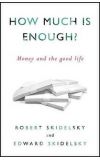
15 Jun 2012 16:41:07
Robert Skidelsky and Edward Skidelsky (a father-and-son/economist-and-philosopher combination) are firmly rooted in the tradition of enlightenment rationalism, but they too seek an economics of enough. Yet it is also the inherent optimism of enlightenment rationalism and its presupposition of continual progress and growth that forms the intellectual hinterland for How Much is Enough?'s opening problematic.
Back in 1930, John Maynard Keynes wrote the essay Economic Possibilities for Our Grandchildren in which he takes "wings into the future", arguing that economic growth and the resulting surplus of wealth would lead to an unimagined world of prosperity and increased leisure for all. So why did this promised land turn out to be a dystopia of greedy bankers and sink estates?
What is fascinating about Keynes's essay is how relaxed it is about greed as one of the important drivers of growth. Morality, he insists, is for the time of leisure that is to come. "Avarice and usury and precaution must be our gods for a little longer still. For only they can lead us out of the tunnel of economic necessity into daylight." Hmmm … what could possibly go wrong?
The Skidelskys resist the idea that growth has a natural limit as some sort of metaphysical fancy, thus distancing themselves from many ecological approaches that regard the planet as a finite resource that cannot sustain continual economic expansion. Technology, the Skidelskys insist, will come to our aid. Moreover, they accuse deep ecological approaches to economics as harbouring a secret puritanism. "Most climate radicals are also passionate haters of greed and luxury, people who in previous ages might have been Cromwells or Savonarolas." The problem, as they see it, is that economic growth has been pursued as an end in itself and not been indexed to any sense of what a good life might look like. Indeed, the very idea of the good life has been so eliminated from public consideration that we are left floundering with the vague rhetoric of happiness, something that has proved insatiable and elusive.
Drawing upon the work of Martha Nussbaum and Amartya Sen and their capabilities approach – as well as a dash of Catholic social teaching – they seek to produce a list of the basic goods that are necessary conditions for this good life, and go on to sketch out a few of the fiscal levers that might be used as a means to this end. Economics, they insist, needs to be impregnated with purpose, with some human‑centred teleology.
In other words, markets were made for man and not man for markets. This is a commendable insight, but whether their prescriptions for an economics of the good life are sufficiently inclusive to work at the level of the poorest in our society – those for whom growth and accumulation are what mostly happens to others – was something about which I was less convinced. Mostly, the Skidelskys are concentrated on the size of the pie and not so much on how the pie is cut up.
In What Money Can't Buy, Michael Sandel comes at things differently. He too would subscribe to the need for a more confident articulation of the good life, having built his philosophical reputation attacking the idea of a free-floating "unencumbered" self that is at the heart of John Rawls's hugely influential Theory of Justice. It is this same rootless self that he regards as unable to resist the power of the market to redefine our deepest values.
Thus, where the Skidelskys are prepared to leave certain liberal assumptions unchallenged, Sandel wants to draw attention to the ways in which the underlying liberalism of the marketplace wipes away a horizon of ethical significance – which is, roughly speaking, what the Skidelskys mean by the good life. In other words, Sandel insists that market values crowd out all other values like a cuckoo in the nest. "There are some things that money can't buy," he begins, "but these days, not many."
Not many indeed. Everything from kidneys to the best university place is now for sale. And the ingenuity of the market is endless. Paying homeless people to stand in the queue so wealthy people don't have to. The market in life insurance policies for the terminally ill, where a book is being made in how long a dying person survives. Marx spoke prophetically of how the market turns people into things and subjects into objects. But could he really have imagined the full extent to which capitalism leads to the commodification of life? In example after example, Sandel charts the full depths of reification. It makes for a terrifying story.
Sandel is a persuasive writer who may be just a little bit too fluent for his own good. For, like his engaging and hugely popular lecturing style – less lecture, more public Socratic dialogue – his technique is to allow wisdom to dawn through the application of practical reflection upon the particular. Is it right to pay children to write thank you letters? This might get them into the habit of writing thank you letters or it might commercialise an activity that ought to have nothing to do with financial reward. Discuss.
Sometimes one wants the real Michael Sandel to stand up a bit more. But this is to be overly critical.
Both books make a valuable contribution to the increasingly urgent literature on the nature of value. They are worth reading together. For they form a part of a much broader picture about the multiple failures of free-market fundamentalism and the moral vacuum in which it has trapped us.

